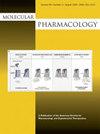Intracellular allosteric antagonist of the olfactory receptor OR51E2
IF 3.2
3区 医学
Q2 PHARMACOLOGY & PHARMACY
引用次数: 0
Abstract
Olfactory receptors are members of Class A (rhodopsin-like) family of G protein-coupled receptors (GPCRs). Their expression and function have been increasingly studied in nonolfactory tissues, and many have been identified as potential therapeutic targets. In this manuscript, we focus on discovery of novel ligands for the olfactory receptor OR51E2. We performed an artificial-intelligence-based virtual drug screen of a ~2.2 million small molecule library. Cell-based functional assay identified compound 80 (C80) as an antagonist and inverse agonist, and detailed pharmacological analysis revealed C80 acts as a negative allosteric modulator (NAM) by significantly decreasing the agonist efficacy, while having a minimal effect on receptor affinity for agonist. C80 binds to an allosteric binding site formed by a network of 9 residues localized in the intracellular parts of TM 3, 5, 6, 7 and H8, which also partially overlaps with a G-protein binding site. Mutational experiments of residues involved in C80 binding uncovered the significance of C2406.37 position in blocking the activation-related conformational change and keeping the receptor in the inactive form. Our study provides a mechanistic understanding for a negative allosteric action of C80 on agonist activated OR51E2. We believe identification of antagonist of OR51E2 will enable multitude studies aiming to determine the functional role of this receptor in specific biological process.嗅觉受体 OR51E2 的细胞内异位拮抗剂
嗅觉受体是 G 蛋白偶联受体(GPCR)家族中的 A 类(类视黄醛)成员。人们对它们在非嗅觉组织中的表达和功能进行了越来越多的研究,其中许多已被确定为潜在的治疗靶点。在本手稿中,我们重点研究了嗅觉受体 OR51E2 的新型配体的发现。我们对约 220 万个小分子库进行了基于人工智能的虚拟药物筛选。详细的药理分析表明,C80 是一种负异位调节剂(NAM),它能显著降低激动剂的效力,同时对受体对激动剂的亲和力影响极小。C80 与一个由 9 个残基组成的异源结合位点结合,这些残基位于 TM 3、5、6、7 和 H8 的细胞内部分,该位点还与一个 G 蛋白结合位点部分重叠。对参与 C80 结合的残基进行的突变实验发现,C2406.37 位置在阻断与活化相关的构象变化并使受体保持非活性形式方面具有重要意义。我们的研究为 C80 对激动剂激活的 OR51E2 的负异构作用提供了一种机理上的理解。我们相信,鉴定 OR51E2 的拮抗剂将有助于进行多方面的研究,以确定该受体在特定生物过程中的功能作用。
本文章由计算机程序翻译,如有差异,请以英文原文为准。
求助全文
约1分钟内获得全文
求助全文
来源期刊

Molecular Pharmacology
医学-药学
CiteScore
7.20
自引率
2.80%
发文量
50
审稿时长
3-6 weeks
期刊介绍:
Molecular Pharmacology publishes findings derived from the application of innovative structural biology, biochemistry, biophysics, physiology, genetics, and molecular biology to basic pharmacological problems that provide mechanistic insights that are broadly important for the fields of pharmacology and toxicology. Relevant topics include:
Molecular Signaling / Mechanism of Drug Action
Chemical Biology / Drug Discovery
Structure of Drug-Receptor Complex
Systems Analysis of Drug Action
Drug Transport / Metabolism
 求助内容:
求助内容: 应助结果提醒方式:
应助结果提醒方式:


